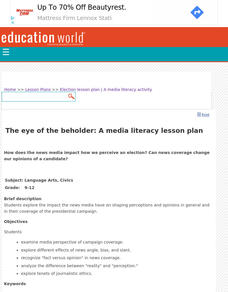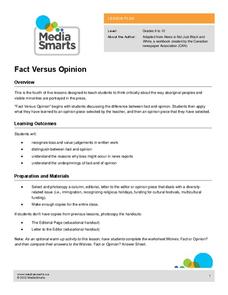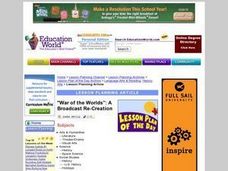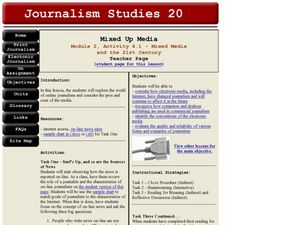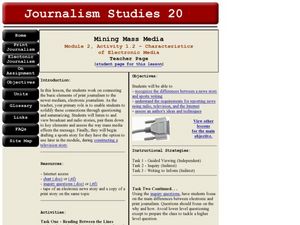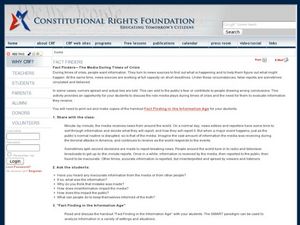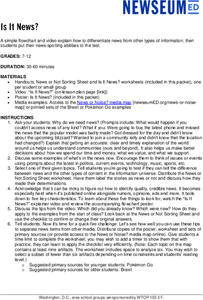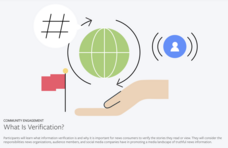Facing History and Ourselves
Free Press Makes Democracy Work
A unit study of the importance of a free press in a democracy begins with class members listening to a podcast featuring two journalists, one from a United States public radio station and one from Capetown, South Africa. The...
PBS
Interviewing: The Art of Asking Questions
Interviewing skills are important, even outside of a news reporter's desk or employer's office. Take your class through the process of interviewing people they don't know with a set of case studies featuring journalists and various...
Newseum
The Speed of News: Where Do We Get the News?
Times are changing. One change is the way people get and share the news. Class members pair up and interview one another to find out how their peers get news. After compiling their findings, young reporters interview an adult, compile...
Curated OER
The Eye of the Beholder: A Media Literacy Activity
Students explore the impact the news media have on shaping perceptions and opinions in general and in their coverage of the presidential campaign.
Media Smarts
Fact versus Opinion
Part of a series aimed at breaking down cultural bias from the Canadian Media Awareness Network, this activity identifies where opinions do and don't belong in a newspaper. Pupils review handouts about the purpose of editorial comments...
Curated OER
News Coverage
Learners compare and contrast methods of media coverage. In this media awareness lesson plan, students keep track of news regarding a world or national issue for the period of 1 week. Learners collaborate to describe the type of coverage...
Curated OER
The Power of One: Convergence in Scholastic Media
Pupils explore the different forms of media utilized by journalism including writing, photography, video, sound and the Internet. In this journalism lesson, students compare and contrast the ways in which information is presented between...
Curated OER
Media Bias
Students analyze mass media to analyze media bias. In this media bias lesson plan, students read example situations and definitions about media bias. Students read and discuss how to be aware of media bias.
Newseum
'The Press and the Civil Rights Movement' Video Lesson
Scholars watch a video featuring journalists who covered the civil rights movement, then respond to questions on a viewing guide. The video features interviews with participants and original news footage from the 1950s and 1960s. In...
Newseum
Free Press Challenges Through History: Analyzing Historical Sources
The debate over the integrity of stories in media is not new. Young journalists analyze historical sources that reveal freedom of the press controversies and draw parallels to challenges freedom of the press faces today.
PBS
Journalism in War Time: What Does the Public Need to Know?
A viewing of the documentary War Feels Like War, launches an exploration of the importance of accurate and comprehensive war reporting. Groups investigate various news agencies and assess the factors that influence their stories. A...
Curated OER
War and the Media Press Freedom vs. Military Censorship
Students analyze the relationship between war and media. In this media awareness lesson, students listen to their instructor present a lecture on freedom of the press and military censorship. Students participate in an activity connected...
Curated OER
"War of the Worlds": A Broadcast Re-Creation
Why did Orson Welles' 1938 Broadcast of a adaptation of H.G. Wells' The War of the Worlds cause such a panic? To answer this question, class members listen to the original broadcast and research the panic that resulted. They then engage...
Curated OER
Debate: Press Censorship
Students consider the responsibility of the media to present newsworthy items while still protecting national security during times of war. They take sides acting as politicians and newsmen and debate the merits of censorship of the media.
Curated OER
Mixed Up Media
Students explore online journalism. In this journalism lesson, students discover how electronic medias are changing journalism, examine the conventions of electronic media, and discuss the authority and reliability of forms of electronic...
Curated OER
Mining Mass Media
Students take a closer look at the attributes of electronic media. For this journalism lesson, students compare and contrast electronic and print versions of the same news stories. Students then write their one broadcast news stories.
Curated OER
Fact Finders—The Media During Times of Crisis
Learners practice finding reputable facts. In this media awareness instructional activity, students review a handout regarding tips for evaluating media and then discover the SMART method which they use to analyze news sources and media.
Curated OER
Is the media aiding Global Peace when reporting on religion?
Young scholars play 'telephone' to simulate communication difficulties. In this media analysis lesson, students read and analyze newspaper articles related to religious tensions between the Pope and Muslims. Young scholars evaluate the...
Newseum
Is It News?
Is it news or not? That is the question young journalists must consider in a lesson about newsworthiness. Class members watch a short video that details five key characteristics of quality, credible news. Individuals then use these tips...
PBS
What Is Newsworthy?
What is news? What is newsworthy? Who decides and what criteria do they use? Introduce young journalists to the basics of reporting with this media literacy lesson.
West Virginia Department of Education
Intelligence of Authentic Character - News Coverage and John Brown's Raid
The resource, a standalone, shows how news coverage of John Brown's Raid began when the event happened and how that reporting shaped perception in West Virginia history. The resource includes interesting anticipatory discussion...
PBS
Journalism Ethics
As a journalist, would you publish everything you heard or saw? Discuss the ethics of journalism with a lesson from PBS. Young reporters imagine themselves to be the editor of their school's newspaper, and as they read five scenarios,...
Newseum
Bias Through History: Analyzing Historical Sources
Young journalists use the E.S.C.A.P.E. (evidence, source, context, audience, purpose, and execution) strategy to evaluate historical and contemporary examples of bias in the news. The class then uses the provided discussion questions to...
Facebook
What Is Verification?
One of the most important skills news consumers and social media users must develop is the ability to determine the veracity of stories they read or view. Here's an interactive lesson plan that teaches high schoolers how to verify news...
Other popular searches
- Broadcast News
- Broadcast Media
- Journalism Hard News
- Elements of Broadcast News
- Broadcast Media Studies
- Advertising Broadcast Media
- Media Journalism
- Journalism News Ethics





